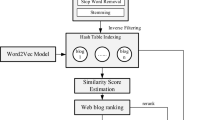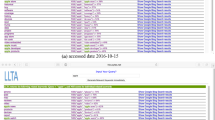Abstract
Blogs are increasingly accepted as a useful means to proliferate a variety of information on the web. As the popularity of blogs grows rapidly, a number of blog search engines have appeared recently to help users access and discover blog posts efficiently. Nevertheless, existing approaches tend to focus on ranking the blog posts according to their recency or popularity only, leaving the problem of retrieving more topic relevant posts to a user’s query largely unexplored. In this paper, we present a novel blog ranking framework, called PTRank, that improves search quality by taking account of relevance feedback from users as well as various information available from RSS feeds. A neural network method is employed to learn ranking functions that provide a relevance score between a keyword and a blog post. Extensive experiments on real blog data have been conducted to validate the proposed ranking framework for blog post search, and the results indicate that PTRank performs significantly better than the existing popular approach.
Similar content being viewed by others
References
Adar, E., Zhang, L.: Structure and the dynamics of blogspace. In: Proceedings of the WWW 2004 Workshop on the Weblogging Ecosystem: Aggregation, Analysis and Dynamics (2004)
Agichtein, E., Brill, E., Dumais, S.: Improving web search ranking by incorporating user behavior information. In: Proceedings of the ACM Conference on Research and Development in Information Retrieval (SIGIR), pp. 19–26 (2006)
Beg, M.M.S., Ahmad, N.: Web search enhancement by mining user actions. Inf. Sci. 177, 5203–5218 (2007)
Bloglines: Available: http://www.bloglines.com (2008). Accessed 1 October 2008
Blogpulse: Available: http://www.blogpulse.com (2008). Accessed 1 October 2008
Borges, J., Levene, M.: Ranking pages by topology and popularity within web sites. World Wide Web J. 9, 301–316 (2006)
Brooks, C.H., Montanez, N.: Improved annotation of the blogosphere via autotagging and hierarchical clustering. In: Proceedings of the 15th International Conference on World Wide Web, pp. 625–632 (2006)
Davision-Turley, W.: Blogs and RSS: powerful information management tools. Libr. Hi Tech News 22, 28–29 (2005)
Duda, R.O., Hart, P.E., Stork, D.G.: Pattern Classification. Wiley, New York (2001)
Fujimura, K., Inoue, T., Sugisaki, M.: The EigenRumor algorithm for ranking blogs. In: Proceedings of the WWW 2005 Workshop on the Weblogging Ecosystem: Aggregation, Analysis and Dynamics (2005)
Fujimura, K., Toda, H., Inoue, T., Hiroshima, N., Kataoka, R., Sugizaki, M.: BLOGRANGER—a multi-faceted blog search engine. In Proceedings of the 15th International Conference on World Wide Web (2006)
Hayes, C., Avesani, P.: Using tags and clustering to identify Topic-relevant blogs. In: Proceedings of the International Conference on Weblogs and Social Media (2007)
Herring, S., Scheidt, L., Bonus, S., Wright, E.: Bridging the gap: a genre analysis of weblogs. In: Proceedings of the Thirty-Seventh Hawaii International Conference on System Sciences (HICSS-37) (2004)
Joachims, T.: Optimizing search engines using clickthrough data. In: Proceedings of the ACM SIGKDD International Conference on Knowledge Discovery and Data Mining (2002)
Joachims, T., Radlinski, F.: Search engines that learn from implicit feedback. In: IEEE Computer, pp. 34–40 (2007)
Kleinberg, J.M.: Authoritative sources in hyperlinked environment. J. ACM 46(5), 604–632 (1999)
Kritikopoulos, A., Sideri, M., Varlamis, I.: BlogRank: ranking Weblogs based on connectivity and similarity features. In: Proceedings of AAA-IDEA ’06 (2006)
Kumar, R., Novak, J., Raghavan, P., Tomkins, A.: On the bursty evolution of Blogspace. World Wide Web J. 8, 159–178 (2005)
Maguitman, A.G., Menczer, F., Erdinc, F., Roinestad, H., Vespignani, A.: Algorithmic computation and approximation of semantic similarity. World Wide Web J. 9, 431–456 (2006)
Page, L., Brin, S., Motwani, R., Winograd, T.: The PageRank citation ranking: bringing order to the Web. In: Tech. rep. 1999–66, Stanford Digital Library Technologies Project, Tech. rep. 1999–66 (1999)
Pikas, C.: Blog searching for competitive intelligence, brand image, and reputation management. Online 29(4), 16–21 (2005)
Radlinski, F., Joachims, T.: Query chains: learning to rank from implicit feedback. In: Proceedings of the ACM Conference on Knowledge Discovery and Data Mining (KDD) (2005)
Rosenblatt, F.: The Perceptron: a probabilistic model for information storage and organization in the brain. Psychol. Rev. 65(6), 386–4.8 (1958)
RSS 2.0 Specification: Available: http://www.rssboard.org/rss-specification (2008). Accessed 1 October 2008
Sia, K.C., Cho, J., Cho, H.-K.: Efficient monitoring algorithm for fast news alerts. IEEE Trans. Knowl. Data Eng. 19(7), 950–961 (2007)
Suitt, H.: A blogger in their midst. Harvard Bus. Rev. 81(9), 30–40 (2003)
Technorati: Available: http://www.technorati.com (2008). Accessed 1 October 2008
Thelwall, M., Hasler, L.: Blog search engines. Online Inf. Rev. 31(4), 467–479 (2007)
Weiss, A.: Your blog? Who gives a @*#%!. Networker 8(1), 38–40 (2004)
Yih, W.-T., Goodman, J., Carvalho, V.R.: Finding advertising keywords on web pages. In: Proceedings of the 15th International Conference on World Wide Web (2006)
Zhou, Y., Chen, X., Wang, C.: A self-organizing search engine for RSS syndicated web contents. In: Proceedings of the 22nd International Conference on Data Engineering Workshops (2006)
Author information
Authors and Affiliations
Corresponding author
Rights and permissions
About this article
Cite this article
Han, SK., Shin, D., Jung, JY. et al. Exploring the Relationship between Keywords and Feed Elements in Blog Post Search. World Wide Web 12, 381–398 (2009). https://doi.org/10.1007/s11280-009-0067-3
Received:
Revised:
Accepted:
Published:
Issue Date:
DOI: https://doi.org/10.1007/s11280-009-0067-3




